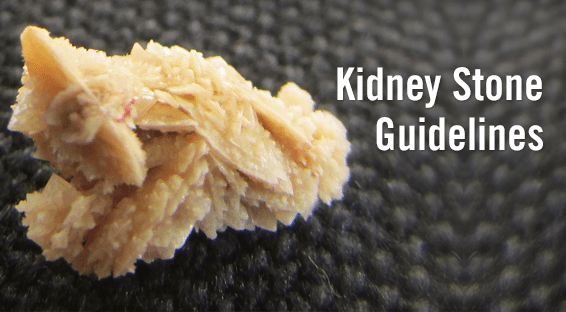Nephrolithiasis—a condition more commonly known as kidney stones—occurs in about 13% of men and 7% of women, according to studies. Kidney stones develop when there is a high concentration of substances that can form crystals in the urine. In most cases, these stones consist of calcium oxalate and/or calcium phosphate, but other substances can also be found, including uric acid, cystine, and struvite. Researchers have reported that the 5-year recurrence rate after an initial event is high, with rates ranging between 35% and 50% without treatment.
To prevent recurrent kidney stones, clinical investigations have suggested changing dietary patterns and using appropriate pharmacologic approaches. These efforts include lithotripsy, decreasing concentrations of lithogenic factors (eg, calcium and oxalate) and increasing concentrations of stone formation inhibitors (eg, citrate). Dietary changes include increasing fluid intake, decreasing dietary oxalate, reducing dietary animal protein and other purines, and maintaining normal dietary calcium.
Helpful Kidney Stone Recommendations
In 2014, the American College of Physicians (ACP) released guidelines on dietary and pharmacologic management strategies to prevent recurrent nephrolithiasis in adults based on comparative effectiveness and safety data. The guideline, published in Annals of Internal Medicine, was based on a systematic evidence review and an evidence report sponsored by the AHRQ. Download the free ACP guideline (PDF).
Two major recommendations were made in the guidelines. “The first recommendation is that patients with recurrent kidney stones should increase their fluid intake throughout the day to achieve at least 2 L of urine per day to prevent recurrent nephrolithiasis,” says Amir Qaseem, MD, PhD, who was lead author of the ACP guideline. However, patients who already drink recommended amounts of liquids and those in whom increased fluid intake is contraindicated should not be directed to increase their fluid intake further. Studies have also been inconclusive regarding the consumption of large amounts of soda.
The second ACP recommendation is to use pharmacologic monotherapy with a thiazide diuretic, citrate, or allopurinol to prevent recurrent nephrolithiasis in patients with active disease if increasing fluid alone is inadequate to prevent stone recurrence. Combination therapy with these agents was not more beneficial than monotherapy. Pharmacotherapy use was associated with several adverse events in some trials, but these were reported inconsistently.
More to Come on Kidney Stone Composition
“Currently, there is insufficient evidence to determine the benefit of knowing the stone composition or blood and urine chemistries on the effectiveness of treatment,” says Dr. Qaseem. “We need more research to determine if preventive therapies can favorably alter the biochemical composition that leads to kidney stone formation. More data are also needed to better guide the selection of pharmacologic therapy.” In the future, it is hoped that randomized controlled trials will seek to determine if there is a link between biochemical testing and improved outcomes.



 Janine Anthes
Janine Anthes